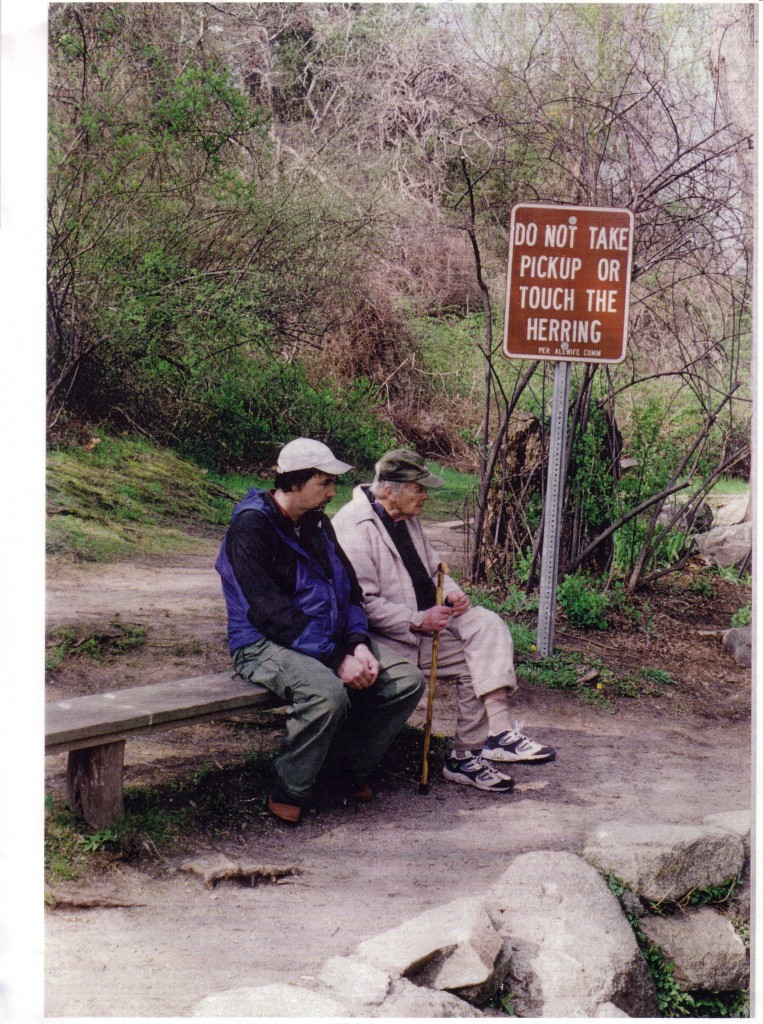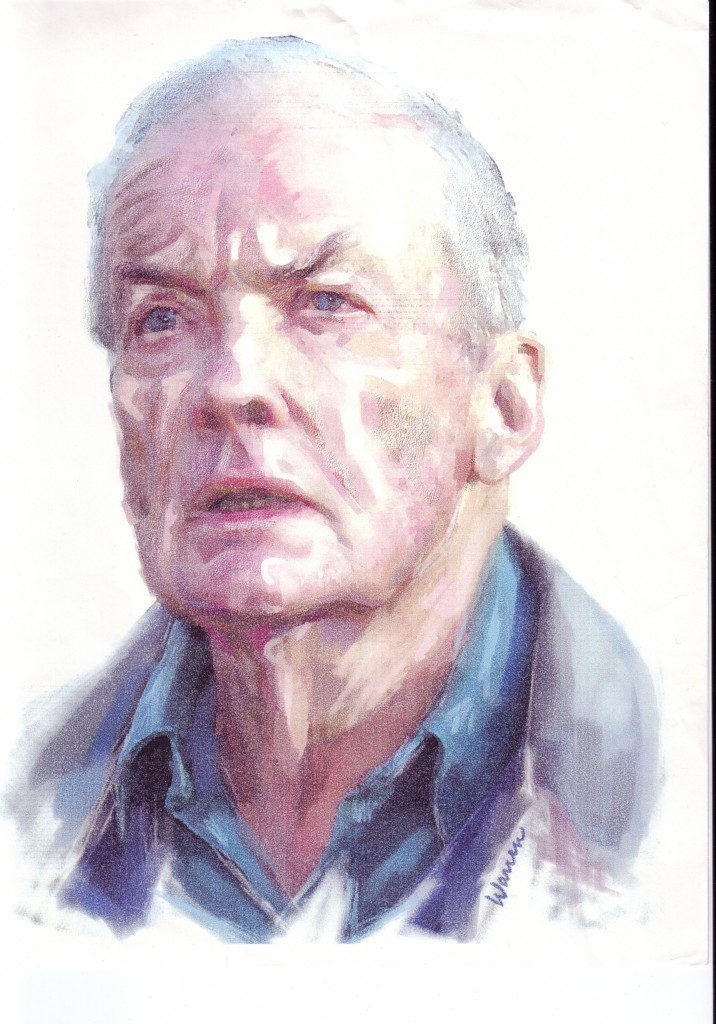Getting Outside Saturday: A Visit to the Herring Run with John Hay
categories: Cocktail Hour
3 comments
 This is adapted slightly from The Prophet of Dry Hill, my book about the great nature writer John Hay.
This is adapted slightly from The Prophet of Dry Hill, my book about the great nature writer John Hay.
I hadn’t seen John in a few weeks, and when I called he seemed relieved to hear from me.
“Just to see the shore would bring me some sanity,” he said. “To get outside into the world.”
He suggested I come between two and three, but at two on the dot my phone rang.
“Dave?” he said. “I’m ready to go.”
I threw my binoculars and bird books in the car and drove over to Dry Hill. John was standing outside when I arrived. He looked terribly thin, his own binoculars hanging from his neck like a weight pulling him toward the ground.
“Thank God you’re here,” he said. “I’ve been surrounded by women.”
He said “women” in a way that made you half expect he’d follow it with “folk.” Though hardly a chauvinist, and though women–from Gemma Lockhart to Deborah Diamond to Janice Riley (who was making a film about his book, The Run)–were some of his dearest friends, he was old-fashioned enough so that the word “womenfolk” wouldn’t have seemed entirely out of place.John often did seem from another time. If there were no answering machines to pick up when you called Dry Hill, there sure as hell were no computers or cell phones. I noticed the tennis shirt he wore beneath his coat and thought of a story that the writer Jennifer Ackerman told me. Jennifer had organized an anthology of nature writing, came out she’d sent all the participants, including John, T-shirts as a thank-you. Before mailing John’s shirt she had called Dry Hill and asked John what size he would like. There was a long pause before he replied. “I don’t know exactly,” he said. “I’ve never worn a T-shirt before.making a film about his book, The Run)–were some of his dearest friends, he was old-fashioned enough so that the word “womenfolk” wouldn’t have seemed entirely out of place.
John often did seem from another time. If there were no answering machines to pick up when you called Dry Hill, there sure as hell were no computers or cell phones. I noticed the tennis shirt he wore beneath his coat and thought of a story that the writer Jennifer Ackerman told me. Jennifer had organized an anthology of nature writing, and asked John to write the preface. When the book came out she’d sent all the participants, including John, T-shirts as a thank-you. Before mailing John’s shirt she had called Dry Hill and asked John what size he would like. There was a long pause before he replied. “I don’t know exactly,” he said. “I’ve never worn a T-shirt before.”
 As we shook hands hello I noticed that John’s hair was even longer, flowing down his neck in thin, almost silvery white waves. He explained that before we drove off on our adventure we had some work to do: we needed to get Deuce the schnauzer back into his cage. This took a little doing, and I thought again how strange it was for the Hays to have become recent owners of a peppy little dog.
As we shook hands hello I noticed that John’s hair was even longer, flowing down his neck in thin, almost silvery white waves. He explained that before we drove off on our adventure we had some work to do: we needed to get Deuce the schnauzer back into his cage. This took a little doing, and I thought again how strange it was for the Hays to have become recent owners of a peppy little dog.
“I’m sorry Deuce,” John said as we finally coaxed and shepherded the dog into the cage. “But if we let you free you’ll crap the rug.”
Once we were back outside, John pointed at the early blooming all around the property. A cherry tree right in front of the house was exploding with deep maroon. This led to talk of the early spring, and, naturally, to the strangely warm weather. As we drove down the driveway I mentioned that I’d just read that a slice of Antarctic ice the size of Rhode Island had caved off into the sea.
“The only ones who don’t believe the world is warming are the politicians in power,” he said. “Good God. Don’t they ever walk outside? These people don’t believe in cause and effect.”
He looked ready to launch into a longer political diatribe, but then reined himself in and smiled.
“Let’s check if there are fish yet,” he said.
We got in the car and drove over to Stony Brook. The day before it had rained heavily, and the brook was pouring downstream in great silver surges. The just-budding green of the briars was highlighted with blood red, and insects rose up from the water like silver flashes at the edge of vision.
“Do you see any?” John asked me as we neared the water.
I peered into the copper-colored stream. I counted six herring in one of the larger middle pools. In the sunlight they looked violet-backed and almost transparent.
“A half dozen or so,” I said.
“Just scouts,” he said.
I mentioned the violet color.
“Another metamorphosis. You know they actually change color as they swim upstream. Let’s see a human do that!”
I asked him when the peak of the run was.
“It really gets going in mid-April,” he said. “Around tax day. Then the stream is choked with fish.”
The few herring in the brook now were circling, recovering from the last tiny waterfall they’d thrown themselves up while gathering energy for the next. In The Run John had written:
I found that they had a circling motion as they moved upstream, within the greater circle of coming in from deep water and returning after they spawned, which was characteristic of other schooling fishes, as well as flocks of birds, not to mention the circle of the seasons within the year, and by collective inference, the lives of men.
“I’m not the linear type,” John said once in an interview. “I circle like alewives and terns and herring gulls. I think it’s more interesting to be circular. You go farther. You take in more.”
There were two other clusters of people at the run and soon one of the clusters migrated toward John. This was his home turf, after all, and a member of the group came up and asked for his autograph. “He’s the most famous herring person,” someone else said. John scrawled down his name on a scrap of paper and dispensed tid-bits about the run. A few people gathered around him while I wandered off.
When I returned we walked up to the spot where the brook poured out of the pond. As we crossed the road, I noticed that John almost tripped twice, recovering both times with little hops and jogs. He was much weaker than he had been in the fall, and I wanted to reach out and grab his arm, but held myself back. After a short while we reached the last gushing waterfall, the herring’s final hurtle until they shot into the relative quiet of the pond. My wife Nina, watching the fish achieve their final goal, had said of the pond, “This is herring heaven.” However, today no fish were making the final ascent and, after studying the water for a while, we doubled back to the car.
Earlier in March Nina and I had taken a trip to Belize. As with most places I travelled, both actual and metaphoric, John Hay had been there first. In fact our friend and tour guide, Alan Poole, who brought us out to a small biological station called Wee Wee Caye, had given John a similar tour a decade before.
One afternoon we took a trip in the whaler to snorkel around a Caye farther south. As we passed a small uninhabited island, Alan explained that it was the home of the southernmost osprey nest in the continent. The bird rose up as if on cue, its shining white head much lighter than those of its northern cousins. I remembered something John had written:
“The osprey is a power of its own, sacred to a million years. More men are needed who in thinking well of an osprey do not thereby think better of themselves.”
Later that evening, back on Wee Wee Caye, I watched the frigatebirds that John had first told me about back on our Cape Cod marsh. They floated over the small island on their long bat-like wings, like kites pointed into the Caribbean wind. I had to agree with the birds’ official upgrading to “magnificent.”
At night we took our mattresses out to the dock and stared up through binoculars at a sky unpolluted by light. With the added magnification every speck of the sky was crammed with white dots, a massive spray of stars.
“When he was here John watched the stars through my binocs and you know what he said?” Alan asked me.
I shook my head.
“He said ‘They look like fish eggs.'”


I love the reverence, Reverend.
I love the reverence, Reverend.
Wonderful essay & S.Johnson would definitely approve of your “Prophet” Bio.
Turning to the “Mundane”, who wins tonight.